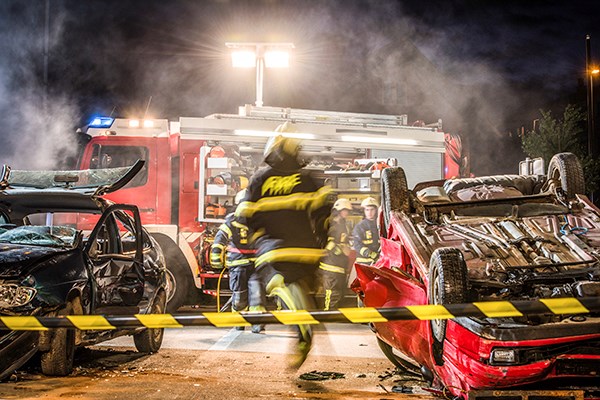The road home beckoned after an utterly draining shift in the ICU. Then came a wreck, self-recrimination - and redemption.
Most days, my ride home is my quiet time. I let the events of the shift fade away, and I do my best to morph from a busy emergency medicine resident into a father and husband focused on his home life. That's most days.
This day, I was just trying not to fall asleep at the wheel...
Exhausted after a seemingly endless stretch in the ICU, I seem to be a passenger on autopilot. Just as I'm daydreaming while staring at the road — BOOM! Cars go everywhere, and smoke rises immediately.
I'm not even sure what happened, and my first thought is frustration that they are blocking the road. I'm off duty, I'm weary, I'm needed at home. Let me go.
I pull closer.
People are running around as if they have no sense of direction. It's pure chaos. I debate even getting out of the vehicle, but my conscience gets the best of me. With years of fire department experience, this isn't my first rodeo. I survey the scene and begin delegating tasks.
Driver 1 is yelling in pain, but responds appropriately to me — check. Driver 2 is...Driver 2?
We have a problem.
Driver 2 is unresponsive and dark blue. Clearly apneic, but "Does he have a pulse?" I yell at bystanders. "Yes, but it's weak," they reply. The volunteer fire department arrives. "Grab a BVM as we extricate the patient." Before long, we've got a roadside cardiac arrest. Intubation, bilateral needle thoracostomies, and IVs — ROSC.
It felt like everything happened fast, but it took almost 1.5 hours to get Driver 2 en route to the hospital. Then, standing on the roadside amid the wreckage, I began to critique our work. What could I have done better? The outcome will not be good; the patient was apneic for a while. Did I do everything possible? Do it right? What a frustrating end to a day. Even when I was finally off work, I wasn't really off. Worse, I didn't have a good feeling about the help I provided.
The morning came all too quickly, and I wandered into the ICU like a zombie to prepare for rounds. But this morning was different. I was getting meaningful looks — a lot of them. Finally, I asked. News of my eventful ride home had traveled fast, and I had a new patient in the ICU with me. You guessed it — Driver 2.
My worries had been well-founded. The outcome looked grim and the prognosis was terrible. They hypothesized hypoxic brain injury. I couldn't help but think about the waste. I couldn't help but think about how exhausted I was, and for what? An extra note after rounds the next day.
Later in the week, as I was still in the ICU, one of the nurses approached me saying that the family of Driver 2 had heard that the doctor who stopped to help at the scene worked here. They knew that much, but they didn't know I was that doctor. She pleaded her case for me to go talk to them. She said, "I know it will be tough, but it's closure for them — do it for them." I didn't feel like I could. I didn't feel like I wanted to try. After all, what good had I really done? "Please think about it," she begged.
Eventually I swallowed my pride and sought out the family.
And I found that they were very thankful for my hard work, not upset that it hadn't been enough. They also donated ALL of their loved one's organs, so what I had viewed as wasted effort turned out to be a lifesaving gift for multiple people, and a way for the family to find a small measure of comfort in their grief. They were thankful for the extra days to say goodbye and for the chance to turn death into life.
In that moment a few of the murky truths of our specialty hit home with me: Even when our efforts are not "successful," they are not in vain. And there's really no such thing as being completely off-duty. We are conditioned to provide the help we can, whenever we can. Sometimes that's inconvenient. It's exhausting. It's confusing. But it's also worthwhile, and even our "failed" efforts can have unexpected, momentous consequences for people we'll never meet.



